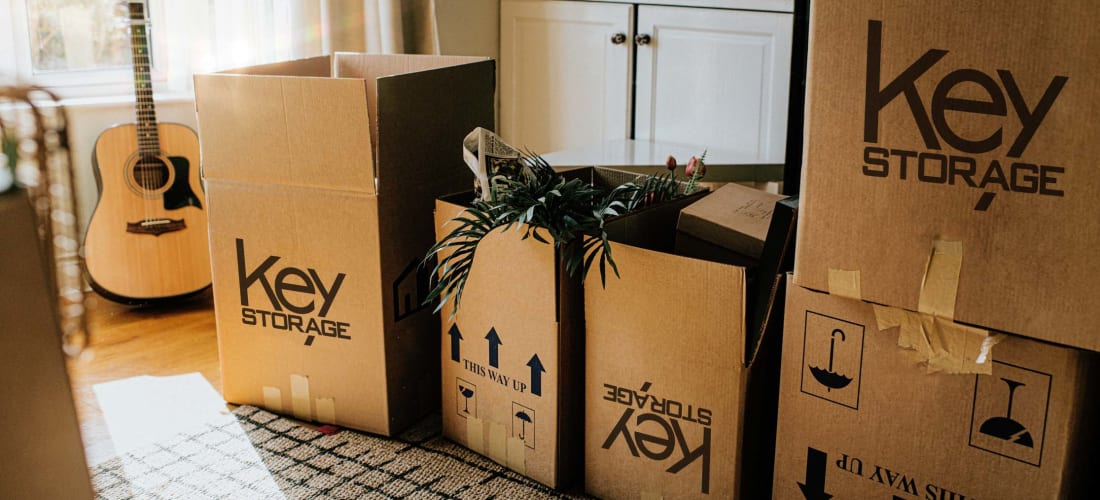Packing Tips for Moving
At one point or another, you're going to have to move. Moving is a part of life, whether you're moving from the dorms back home, from your parent's house to your first apartment, or from one house to another.
Few people enjoy the process of moving, but there are moving tips you can use to make the process easier. These moving tips focus on packing, something many people wait until the last minute to do and then become overwhelmed. However, packing for moving doesn't have to be as stressful as we make it. Use these moving and packing tips to learn how to move with less stress.
2. Sell, Donate, or Discard Unwanted Items
3. Organize Important Documents
7. Label Boxes
The Bottom Line: Tips for Packing for a Move
1. Start Packing Early
One of the best tips on packing for a move we can give you is to start early. The earlier you start packing, the easier packing will be. Also, starting as early as possible reduces the amount you have to pack in the days leading up to the move.
We recommend starting at least a few months before the move, allowing you to pack up the things you don't use on a regular basis and slowly move throughout your home. The best part about starting early is that you only need to spend a few minutes a day packing, so it doesn't seem as overwhelming as waiting until the last second.
2. Sell, Donate, or Discard Unwanted Items
As you begin packing up your home, consider items that don't need to make the move with you. Decluttering your home before you start packing can help remove items and make the packing process much more manageable. Things you haven't used or even seen for years can be sold, donated, or thrown away. This moving tip will not only help you pack faster, but it makes it so you don't have to carry these items throughout the move, saving you time.
3. Organize Important Documents
Organizing important papers like insurance documents, taxes, pay stubs, mortgage agreements, birth certificates, and so forth, will ensure you know where they are after you move. Items can easily get lost or misplaced in a move, and when it comes to important documents, like Social Security cards, knowing they’re safe and secure is essential. Organizing your important documents now prevents misplacements from happening, ensuring you know where everything is if you need them.
4. Purchase Packing Supplies
A good moving house tip is to purchase packing supplies like boxes, bags, furniture coverings, tape, markers, and so forth. This allows you to start packing as soon as possible while ensuring your belongings are safe from dents, scratches, and breaking during the move. Then, if you run out of supplies, you'll have enough time to go out and purchase more.
You can also get creative if you want to save on packing supplies. For instance, you can put clothing and linens in garbage bags instead of boxes and tape your dresser drawers with clothes still in them for a more efficient move.
5. Pack Room by Room
Going room by room can help you properly organize your belongings and label boxes. You can start in any room you want with a labeled box and start packing. While it might be tempting to pack from multiple rooms at once, it’s not recommended, as it can make it easier for items to get misplaced. After your move is over and you unpack, you want to be able to find everything you're looking for, and packing room by room makes it easier to unpack room by room.
Additionally, if you're storing items, packing by room can help you better organize your storage unit and take inventory of your belongings.
6. Disassemble Furniture
Whether you're moving or storing furniture, we recommend disassembling it. Disassembling furniture saves space in your moving truck and makes large pieces of furniture like your dining room table easier to carry. If you choose to protect your furniture by wrapping it, disassembling allows you to wrap every piece of your furniture, including table tops and legs, to avoid scratches during the moving process.
7. Label Boxes
Labeling boxes is crucial and will make unpacking much easier. After you've moved all your belongings into your new home, you'll be tired. The best way to make unpacking easier on yourself is to keep your boxes labeled so you know what's in them. This way, you won't have to unpack everything at once to find something you need immediately.
8. Create an Inventory
Creating an inventory goes one step further than labeling boxes and ensures you know exactly where all your belongings are. You can create an inventory on a sheet of paper with all the belongings in each box to help you easily find them during the unpacking process, or use an online system or spreadsheet that can be accessed from your phone or computer.
9. Pack an Essentials Box
Few people have the energy to move all their belongings from one place to another and unpack all in the same day. Having an essentials box ensures you have everything you need for the next few days without the need to unpack every box. Your essentials box should include the basics like your toothbrush and toothpaste, clothing, and anything else you use on a daily basis.
10. Load Heaviest Items First
When loading your moving truck, you should always load the heaviest items first. Not only does this get them out of the way so the rest of your move is much easier, but it prevents them from falling over on lighter items and breaking or causing damage. Heavy items like dining room tables, beds, and recliners should be on the bottom of your moving truck so they don't damage your other belongings.
The Bottom Line: Tips for Packing for a Move
Hopefully, these tips for packing make it easier to pack your belongings and reduce your moving stress. Need more help? Check out our tips for packing smarter.
Unfortunately, regardless of where you're moving or why, you might have items that you don't want to move with or get rid of. When you want to keep your belongings but don't have enough space for them, consider self-storage.
Key Storage offers various storage options at our convenient storage locations near you. Browse our listings to find the right size based on your needs.


